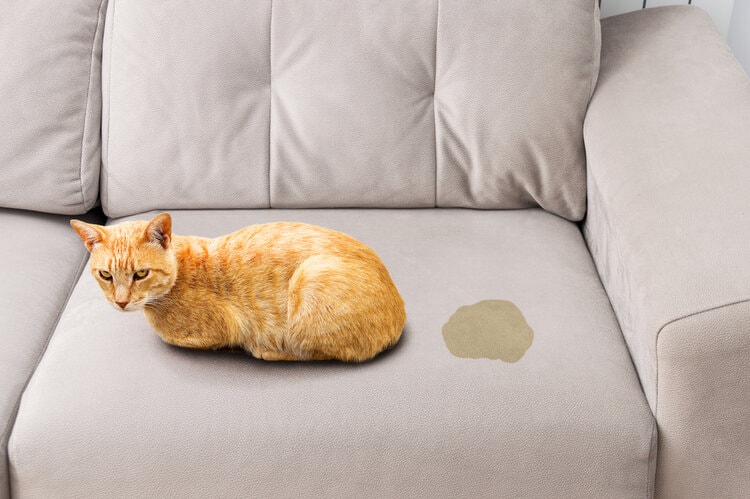
Cats can be sensitive animals that can feel like their whole world has been rocked by a simple change in their environment. Sometimes, when cats are stressed, they will begin urinating in inappropriate places to show their feelings. If your cat starts peeing right outside their litter box, then there could be something off with the litter box location, the litter, or your cat’s urinary health.
Unfortunately, some cats will take their disappointment or stress out on your furniture. We all know how difficult it can be to clean cat urine off of things, especially absorbent things like couch cushions, not to mention how inconvenient it is to find random pee spots. It’s important to understand the potential causes of this behavior so you can help remedy it for your cat and your own sanity.
The 10 Reasons Why Your Cat is Suddenly Peeing on the Couch
1. Medical Conditions
If your cat has started peeing on the couch and there is not another immediately evident cause, then you need to have your cat evaluated for a medical problem. Urinary tract conditions, kidney disease, kidney stones, diabetes, constipation, and generally feeling unwell for other reasons can all lead to inappropriate urination.
It’s very common for your cat to start peeing outside the box if they are uncomfortable in their box or they are having trouble holding their urine, so they’re just going wherever they are when the urge hits. For cats with constipation and urinary problems, the litter box can take on a painful and uncomfortable connotation for them. This pain leads to an aversion to the litter box because your cat will connect their pain with occurring primarily when they are in the litter box.
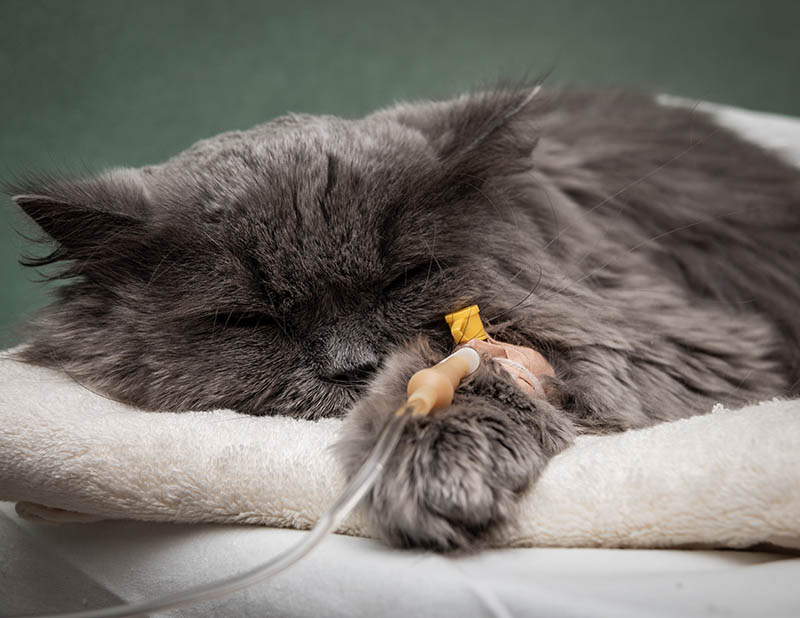
2. Stress and Anxiety
If your cat is feeling stressed or anxious, it can lead to inappropriate urination. This is a pretty common way for cats to respond to stress, and there are thousands of things that could be causing your cat stress. If you’ve ruled out a medical cause of your cat’s inappropriate urination, then take a hard look at everything you can think of to determine if it’s possible that your cat is stressed. A new house mate, building work, new furniture, weather changes, visitors, multicat households to name a few. The indoor pet initiative is a great resource to help learn about cat stressors, even if your cat is indoor/outdoor.
Stress can be remedied by removing the stressor or helping your cat adjust to the stressor. Sometimes, stress and anxiety in cats is caused by something you have no control over such as a neighborhood cat, but your vet is a great resource for finding ways to manage your cat’s stress at home.
3. Litter Box Issues
Everyone has a preferred cat litter, as well as a preferred location for the litter box and litter box type. Did you know that your cat also has preferences about these things as well, and they don’t always align with your preferences? Cats may begin urinating inappropriately because something has changed with their litter box. This can be a change in the litter, even if it’s the same type but scented differently or the litter box being moved.
Once your cat has become accustomed to your litter box, they may form a strong preference for it to stay that way. If you move their box to a different room or replace it with a different type of box, your cat may feel disoriented or stressed and find other, more familiar and comfortable places to go. And what’s more familiar and comfortable than the couch cushions?
Ensure you are cleaning the tray of deposits at least once a day as smell plays an important role in cat litter tray use. Check that you have enough litter boxes, 1 per cat and 1 extra and that they are in quiet, private areas of the house away from food and water dishes.
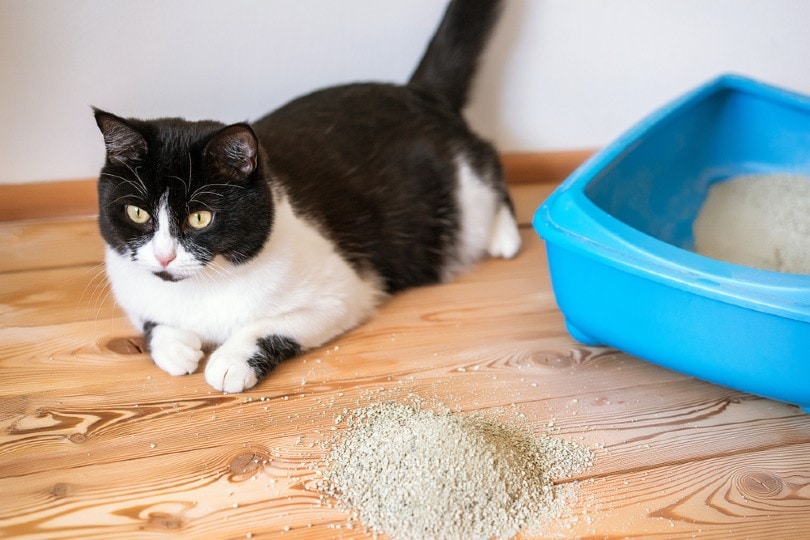
4. Fear
Cats that are fearful, whether acutely or chronically, may urinate inappropriately due to the physiological response to fear. This most often occurs in situations where your cat feels in danger. If your cat finds a place that makes them feel safe, they may be hesitant to leave the perceived safety of that space.
Identifying your cat’s fear and managing it is the best way to fix this issue. Depending on the cause of the fear, this may take a few minutes or months. If your cat pees on the couch every time you bring out the vacuum, then you can work on behavior modification training and keep your cat put away when the vacuum is out. If your cat is fearful of another animal or person in the home, then this may require slow and gentle reintroductions multiple times until everyone feels comfortable and safe.
5. Changes in Routine
Just like with the litter box, cats are often sticklers for routine. Changes in routine can lead to inappropriate urination because of stress and difficulty adapting. The routine in question can be a routine that your cat has established, like watching the birds in your window every morning, or a routine within the home, like when you go to work.
During the pandemic, many cats became accustomed to their owners working from home. While some of them didn’t like the extra company, others were very pleased to have their people home so much. Once people started trickling back into the office, many pets became confused and stressed, leading to behavioral problems, like inappropriate urination. If a routine is within your control, do your best to make it as comfortable and soothing for your cat as possible.
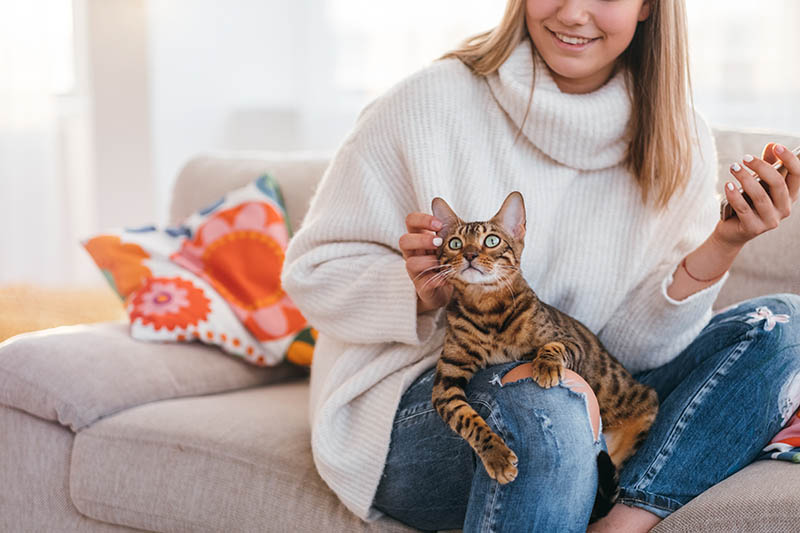
6. Changes to the Environment
Your cat isn’t just particular about their litter box and routines! Cats are also big proponents of their environment staying the same. Some cats are laid back enough to handle a new couch replacing an old couch, but other cats can be extremely uncomfortable with environmental changes. Urinating on objects helps to mark territory as belonging to the cat and this increases their feeling of safety.
New furniture can become a target of your cat’s peeing habits, especially if they are unhappy with the change to the environment. Keep in mind that the smallest changes can be noticeable and stressful for your cat—even something as simple as washing their bed, replacing their favorite blanket or laundry being left on the floor. Big stressors, like bringing home a baby or a new pet, can require a major adjustment period for most cats. Your cat will eventually adjust to changes in the environment, but it may take time, patience, and behaviorist support.
7. Marking
Many animals use their urine as a way to mark their territory. Leaving their urine behind lets other animals, especially of the same species, know that that specific area is occupied. Marking can also be used to attract a mate. Due to the hormones associated with sex organs, your cat is far more likely to mark in the house if they are not spayed or neutered.
If there is a specific reason for your cat to stay intact, like a condition that doesn’t allow for anesthesia, then you can talk to your vet about options for managing the hormonal issues within the home. Otherwise, your cat should be spayed or neutered as soon as they are old enough. Some cats that reach full sexual and physical maturity before being fixed will continue to mark out of habit, requiring training to adjust the habit.
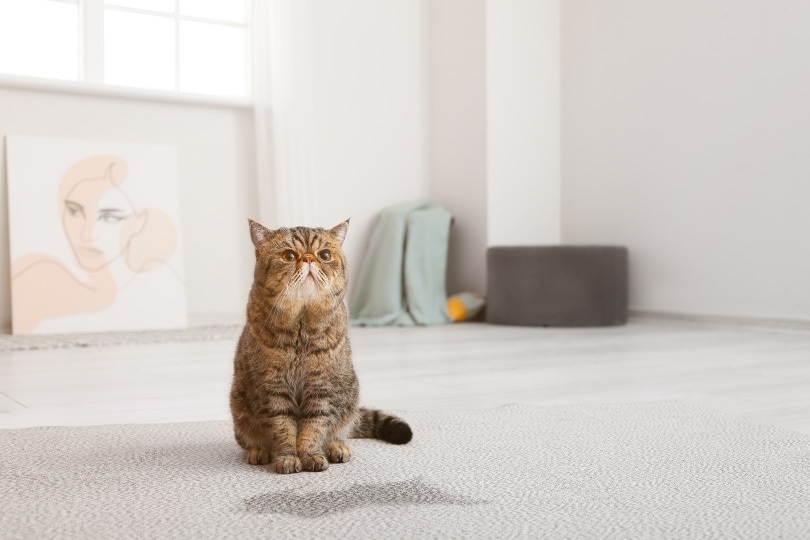
8. Cognitive Decline
It’s an unfortunate fact of life that cats live much shorter lives than humans. This means that many of us are around to watch our beloved cats decline as they age. Many cats stay quite healthy or with manageable medical conditions into old age, and many people know to expect changes like arthritic joints. Unfortunately, many people don’t realize that, like people and dogs, cats can experience cognitive decline as they age.
Cognitive decline is when your cat’s mental faculties or ability to process information appropriately begins to slip. This can lead to confusion for your cat, or simply not realizing that they aren’t peeing in the correct spot. Just like with people experiencing cognitive decline, your cat may require a little extra support to find the right places to potty, as well as eat and sleep.
If your cat begins urinating inappropriately because of cognitive decline, try not to become frustrated. Your cat isn’t aware that they are doing something inappropriate and may feel confused or scared by your frustration. Contact your veterinarian for help in managing feline brain aging difficulties.
9. Incontinence
Urinary incontinence isn’t very common in cats, but it does occur due to medical conditions or old age. For cats with urinary incontinence, they have little to no control over their urination. This can lead to your cat urinating as they walk or sleep. It isn’t uncommon for pets with incontinence to pee on furniture because they are spending time in a comfy space and are unaware that they are urinating.
Like with cognitive decline, it’s important for you to stay patient and understanding with your cat. Urinary incontinence is not within their control, and some cats may feel stressed or upset when they realize they’ve urinated somewhere inappropriate. The added tension of you being upset with them will only make the situation worse for both of you. A full medical check up is recommended for any cat experiencing incontinence.
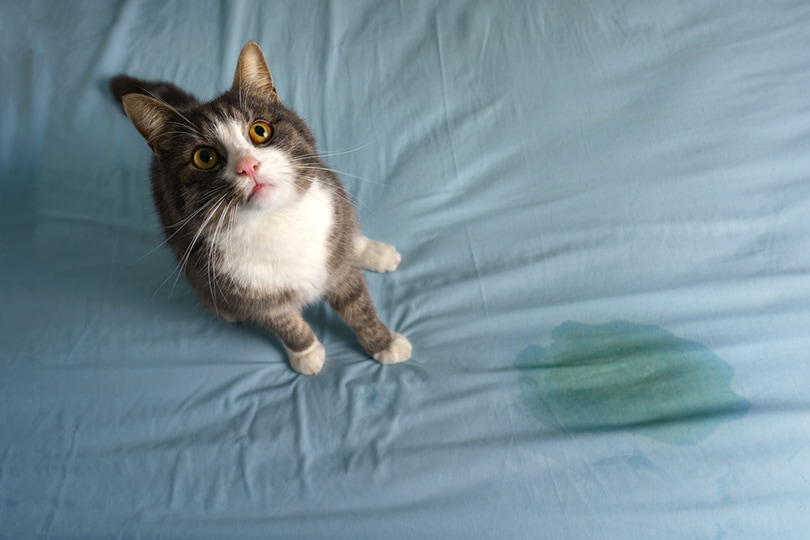
10. Mobility Problems
Inappropriate urination related to mobility problems is most common in older cats, but it can also happen to cats with physical deformities and disabilities. Conditions like arthritis and cerebellar hypoplasia can make it difficult for your cat to get in and out of the litter box. This can lead to your cat urinating in spaces that they are able to safely and comfortably get to. After all, a couch cushion is much more comfortable and forgiving than a hard litter box.
If your cat is experiencing mobility problems, there are a ton of things you can try, depending on what type of mobility issue they are experiencing. Low-sided litter boxes or litter boxes with low entrances or ramps are a great way to make them more accessible to cats with mobility problems. You can also make the litter box more accessible by adjusting its location. If your litter box is located upstairs, it may be difficult for your cat to get to it. You want to find ways to make getting to and using the litter box as comfortable as possible for your cat.
Conclusion
If your cat begins peeing on your furniture or in other inappropriate places in your home, then you should start by taking your cat to the vet to rule out a medical condition. Infections and diseases can be life threatening if left untreated, and if you assume you are dealing with another type of problem and don’t take your cat to the vet for months, then they could be in discomfort for a long time. Cats are prone to cystitis in response to stressful situations so both physical and mental health need to be considered.
In every situation, work to make your cat’s litter box easily accessible to them. Make sure you have at least one litter box for every cat in your house, plus one extra litter box. You should also work to make your cat’s environment as stress free and routine as possible.
Featured Image Credit: cunaplus, Shutterstock







